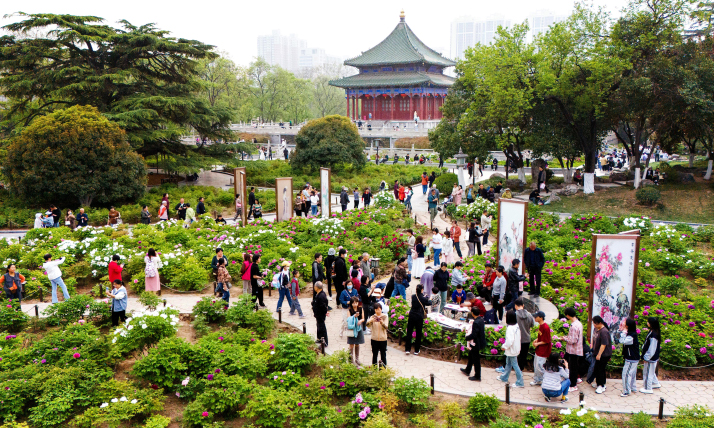| China |
| The key to joy is returning to nature | |
|
|
 A visitor dressed up in traditional Chinese clothing poses for a photo in a park in Beijing on April 14 (XINHUA)
One Saturday in April, Ai Xiao, a 28-year-old Beijing professional, did something she had rarely done previously: going by herself to a park near her apartment and lying on the grass. "It seemed a bit weird since most of the people there were with their families, and not many of them were lying down," Ai told Beijing Review. However, she quickly forgot the awkwardness, being soothed by the warm, bright sunshine, the sound of birds chirping, the wind moving through the trees, and the fresh, sweet smell of grass. Lying on the grass, she felt an immediate coziness and sense of wellbeing. This joyful experience entered Ai's life through a research finding that recently went viral on Chinese social media: spending just 20 minutes in an urban park helps to increase emotional wellbeing. The finding was published in a paper titled Factors Associated With Changes in Subjective Wellbeing Immediately After Urban Park Visit in the International Journal of Environmental Health Research in 2019. Now known in China as "the 20-minute park effect," the finding has triggered a trend of hanging out in parks, especially for nine-to-fivers who are under stress from work and life and eager to refresh their body and mind. Cure for the soul Urban parks are key neighborhood places that provide residents with opportunities to experience nature and engage in outdoor activities. Through contact with the natural environment and engagement in health-promoting or social and recreational activities in parks, users experience physical and mental health benefits such as stress reduction and recovery from mental fatigue, according to the study, conducted by Hon K. Yuen and Gavin R. Jenkins, professors in the Department of Occupational Therapy at the University of Alabama at Birmingham in the U.S. Chinese people are embracing parks near their homes or offices and many, especially the young, have posted their pictures and feelings on social media. These posts often elicit enthusiastic responses from others, with many exclaiming: "The 20-minute park effect is real!" In addition to natural landscapes and wildlife, families taking their children to bathe in the sunshine or friends enjoying a picnic, parks are also home to scenes and activities unique to China. For example, seniors dressed in loose, almost pajama-like outfits honing their tai chi skills, an ancient and distinctive Chinese form of exercise that involves flowing and rhythmic movements; music lovers livestreaming themselves singing in parks or bringing their own video screens and speakers to sing karaoke; groups of retirees performing square dancing, a physical activity or a type of public jazzercise popular with middle-aged and retired women; bands performing Chinese operas with traditional musical instruments in pavilions and under pergolas. "Seeing all those people enjoying life in the beautiful parks, you can't help being infected by the positive spirit," Ai said. "It's pretty easy to find a park in Beijing. It's like exchanging just 20 minutes of my time for a more chilled-out me in the rest of the day. After that, the 'stink of work' on me dissipates. It's totally worth it." For Zhong Lin, a resident of Hangzhou in Zhejiang Province, leisure time spent in the park is like a miracle-working medicine. Facing challenges in his business, the pressure of raising a school-age daughter, and keeping up with home-loan repayments, Zhong began to suffer from insomnia. One sunny afternoon in March, Zhong decided to take a walk in a local park to try to improve his state of mind. At the riverside park, he found budding willow trees, blooming magnolias, an elderly man fishing and children at play. He said, in that moment, the troubles that had been weighing on his mind for a long time disappeared, and a long-forgotten sense of lightness overcame him. From that day on, as long as it isn't raining heavily, Zhong takes time out of his day for a stroll around the park. Sometimes he listens to audiobooks while he walks; other times he brings a book, finds a bench and sits down to read; and sometimes he does nothing at all, just enjoying the breeze and the sunshine. After a month of doing so, Zhong's insomnia has disappeared, and his mindset has become much more balanced. He no longer feels as anxious about the difficulties he is facing, believing that everything will work out in due course. "Going to the park to unwind has become a part of my daily routine now. By immersing myself in nature, I've heard the voice within me and found the strength to keep moving forward," Zhong told local news portal Hangzhou.com.  An exhibition of peony flowers in the Xingqinggong Park in Xi'an, Shaanxi Province, on April 7 (XINHUA)
More parks In recent years, many regions across the country have launched greening initiatives. According to a National Greening Commission report released in March, in 2023, the country has built or upgraded 34,000 hectares of urban green space, and increased the green coverage ratio of villages to 32.01 percent. In 2023, China built 4,100 pocket parks and over 5,300 km of greenways, and expanded its open lawn spaces by 11,000 hectares as part of national urban renewal projects, according to Ni Hong, Minister of Housing and Urban-Rural Development. Pocket parks, or small urban parks, that are created in small, often irregular-shaped, underutilized spaces within a city, are designed to serve the immediate surrounding neighborhood and meet the recreational needs of local residents. The ministry announced the country plans to add 4,000 of these parks this year. Cities are also stepping up efforts to improve residents' immersive experiences in parks. For example, Jinan in Shandong Province encourages the hosting of fairs and performances in its more than 1,000 parks of different sizes. Xi'an, capital of Shaanxi Province, has built sports-themed parks equipped with running trails, ball courts and multipurpose indoor stadiums, enabling residents to enjoy sports in the middle of the greenery. "As parks become more convenient, I believe more people will visit and enjoy them, and grow their love for nature and all the creatures in it," Ai concluded. (Print Edition Title: Parks for Pleasure) Copyedited by G.P. Wilson Comments to luyan@cicgamericas.com |
|
||||||||||||||||||||||||||||
|